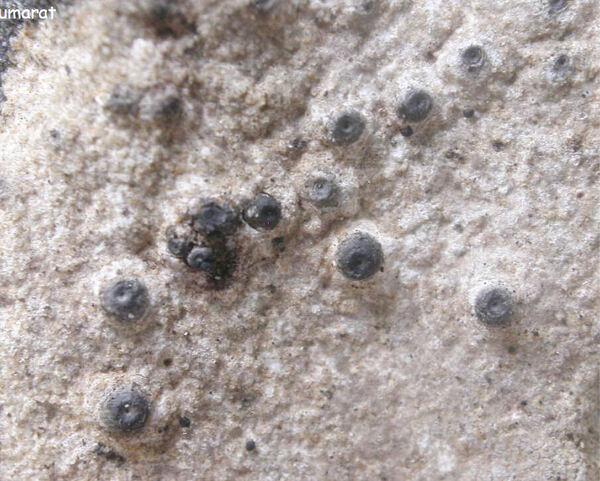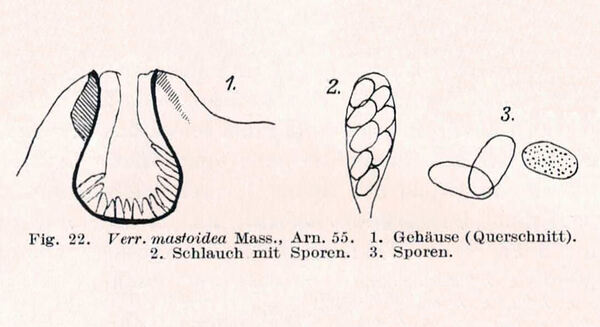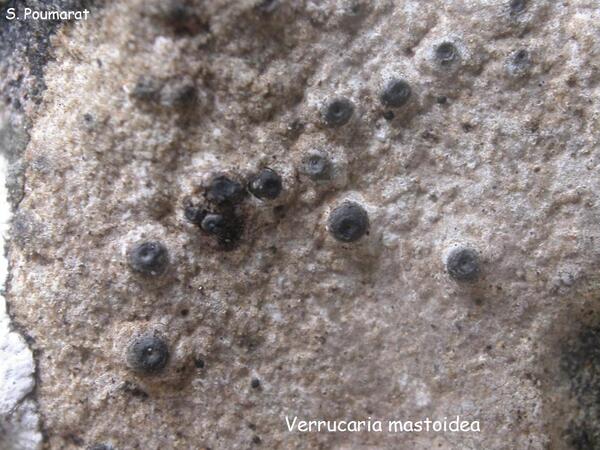Verrucaria mastoidea (A. Massal.) Trevis.
Conspect. Verruc.: 8, 1860. Basionym: Amphoridium mastoideum A. Massal. - Symmicta Lich: 82, 1855.
Synonyms: Verrucaria papularis var. platyspora Garov.
Distribution: N - Ven (Lazzarin 2000b), TAA (Jatta 1909-1911), Piem (TSB 32940). C - Tosc (TSB 35323). S - Pugl (Jatta 1909-1911).
Description: Thallus crustose, endosubstratic, continuous, whitish to pale grey, without a distinct prothallus. Perithecia black, globose or subglobose, 0.4-0.7 mm wide, immersed in swellings of the thallus. Involucrellum black, apical, c. 40-50 μm thick, appressed to exciple and forming a ring around the ostiole; exciple pigmented throughout, brown-black, K+ darker brown; hamathecium of periphyses and periphysoids measuring 40-45 x c. 2 μm, interascal filaments absent; hymenial gel hemiamyloid, I+ red (I+ blue at very low concentrations of I), K/I+ blue. Asci 8-spored, clavate, I-, fissitunicate, the wall thickened above, with an ocular chamber, dehiscent by extrusion of an endotunica to form a delicate rostrum, Verrucaria-type. Ascospores 1-celled, hyaline, ellipsoid to broadly ellipsoid, (21-)28-38(-48) x 12-21(-24) μm. Photobiont chlorococcoid. Spot tests: K-, C-, KC-, P-, UV-. Chemistry: without lichen substances.Note: on calciferous rocks; according to Breuss (2002) this poorly known species differs from V. hochstetteri in the presence of a small involucrellum; according to Pykälä & al. (2020), the syntype specimen is probably conspecific with V. viridula.
Growth form: Crustose
Substrata: rocks
Photobiont: green algae other than Trentepohlia
Reproductive strategy: mainly sexual
Poorly known taxon in need of further study
Commonnes-rarity: (info)
Alpine belt: rare
Subalpine belt: rather rare
Oromediterranean belt: extremely rare
Montane belt: very rare
Submediterranean belt: very rare
Padanian area: absent
Humid submediterranean belt: extremely rare
Humid mediterranean belt: absent
Dry mediterranean belt: absent

Predictive model
Herbarium samples
Growth form: Crustose
Substrata: rocks
Photobiont: green algae other than Trentepohlia
Reproductive strategy: mainly sexual
Poorly known taxon in need of further study
Commonnes-rarity: (info)
Alpine belt: rare
Subalpine belt: rather rare
Oromediterranean belt: extremely rare
Montane belt: very rare
Submediterranean belt: very rare
Padanian area: absent
Humid submediterranean belt: extremely rare
Humid mediterranean belt: absent
Dry mediterranean belt: absent

Predictive model
| Herbarium samples |
 INDEX FUNGORUM
INDEX FUNGORUM
 GBIF
GBIF
 DOLICHENS
DOLICHENS




